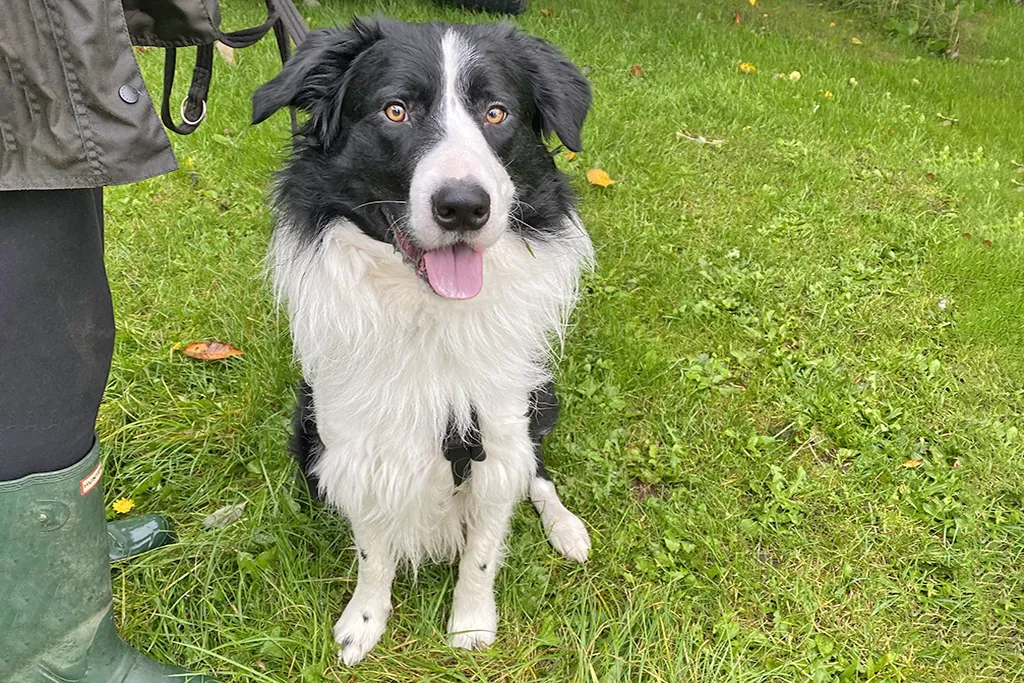Border Collies are renowned for their intelligence and energy, making them wonderful companions. However, some Border Collies can develop aggression towards other dogs, often manifesting as barking, lunging, or growling. This behaviour, commonly known as lead reactivity, can be distressing for owners and challenging to manage. This article delves into the reasons behind Border Collie Aggression Towards Other Dogs and offers effective strategies for positive behavioural modification.
Max, a 2.5-year-old Border Collie weighing 27kg, initially enjoyed the company of other dogs. However, around the age of one, he began experiencing negative encounters with other dogs during walks. These unfriendly greetings led him to associate loud barking and lunging with making the perceived threat go away. When on a lead, Max’s ability to flee is restricted, leaving him feeling trapped and resorting to a “fight” response when faced with fear. This is a common scenario where a dog’s instinctual “flight” option is removed, forcing a “fight” reaction.
The most effective approach to address lead reactivity in Border Collies stemming from fear is to shift their association with other dogs from one of threat to one of positive experiences. This is achieved through a combination of desensitisation and counter-conditioning.
Understanding Desensitisation and Counter-Conditioning for Border Collie Reactivity
Desensitisation: Gradually Increasing Exposure
Desensitisation is a systematic process of gradually exposing a reactive dog to their trigger – in this case, other dogs – at a low intensity and slowly increasing the exposure over time. The goal is to allow the Border Collie to learn that other dogs can be present at a safe distance without any negative consequences, even when they are not exhibiting barking or lunging behaviours.
A critical aspect of desensitisation is identifying the “threshold” distance. This is the distance at which the dog can observe the trigger without becoming over-aroused and exhibiting the unwanted behaviour. Once a dog crosses their threshold, their ability to process information and learn effectively diminishes. Therefore, maintaining the dog’s calm state is paramount. Max’s owners were guided to observe his body language meticulously to determine the distance at which he felt safe and secure around other dogs.
 A Border Collie on a lead looking alertly at another dog in the distance.
A Border Collie on a lead looking alertly at another dog in the distance.
Counter-Conditioning: Shifting Emotional Responses
Counter-conditioning focuses on altering a dog’s automatic emotional response to a particular stimulus. Currently, Max experiences panic, fear, and anxiety when another dog approaches. Through counter-conditioning, we aim to transform these negative feelings into positive associations, such as interest or even excitement, whenever he sees another dog. This process targets the dog’s involuntary emotional reactions rather than their outward behaviour. By keeping Max at a safe distance where he doesn’t feel compelled to react with barking and lunging, we indirectly teach him that the problematic behaviour is unnecessary for his well-being, leading to behavioural changes by default.
Maintaining a Safe Distance to Prevent Reinforcement of Reactivity
The success of desensitisation and counter-conditioning hinges on preventing the dog from practising the reactive behaviour. This means actively avoiding situations where Max might encounter other dogs unexpectedly, such as around blind corners or in busy areas. He must consistently be kept at his designated safe distance to feel secure.
As the desensitisation and counter-conditioning processes begin to yield results, Max’s “safe distance” will gradually decrease, allowing him to tolerate and eventually enjoy passing other dogs on the street. This requires meticulous and consistent application of the training plan by his owners.
Beyond addressing Max’s fears through desensitisation and counter-conditioning, his owners were also introduced to engaging games that could further enhance the positive changes.
Engaging Games to Aid Behavioural Modification
Lesley McDivitt’s Control Unleashed program offers a series of games specifically designed to help reactive dogs. There is substantial evidence suggesting that when dogs are fearful, engaging them in patterned behaviours and enjoyable activities already associated with positive feelings can significantly boost the effectiveness of desensitisation and counter-conditioning efforts. Border Collies, in particular, excel at pattern recognition, which helps them predict events and feel more secure. These games are invaluable for teaching Max to associate the presence of other dogs with positive experiences, thereby reducing fear and aiding in any unforeseen encounters that may occur during the training program.
Previous trainers had advised Max’s owners to divert his attention from the perceived threat (other dogs) and redirect it back to them, while also telling him “no” to curb the behaviour. This approach presents two significant challenges:
- Focus on the Threat: When a dog is experiencing fear and heightened arousal due to the presence of another dog, it is highly improbable that they will willingly disengage their focus. The dog remains vigilant, anticipating a potential threat, as past experiences may have taught them.
- Ineffective Behavioural Correction: Scolding or demanding a dog to look away does not address their underlying fear response to the other dog. In fact, such methods can exacerbate their fear and anxiety.
We will equip Max’s owners with three enjoyable games to train him. These games will be implemented concurrently with the desensitisation and counter-conditioning work, collectively aiming to transform Max’s associations with and reactions to other dogs from fear and reactivity to pleasure and enthusiasm. Further details on how these games contribute to behavioural change will be elaborated on in an upcoming blog post.
Following their initial session, Max’s owners demonstrated a clear understanding of the concepts, a commitment to the training regimen, and eagerness to embark on the journey of transforming Max’s feelings towards other dogs. We will maintain contact to monitor their progress.
Update:
We recently received the following encouraging update from Max’s owners:
“Max Update! We took Max out last weekend and he only barked at one little dog that came out of nowhere and wouldn’t move. His barking and lunging have 90% stopped and we can get his attention if not too close.”
Congratulations to the owners on this remarkable progress!
